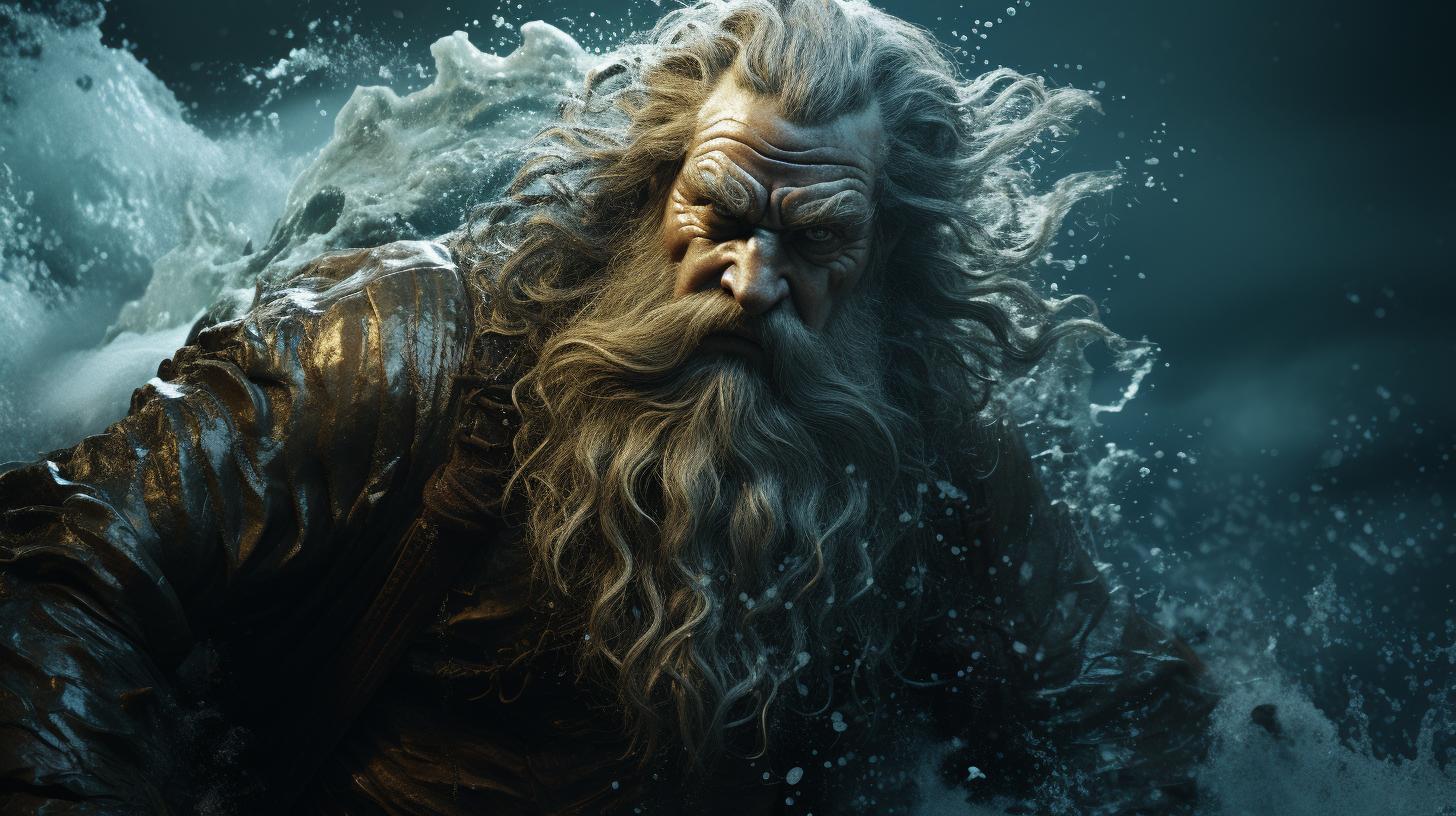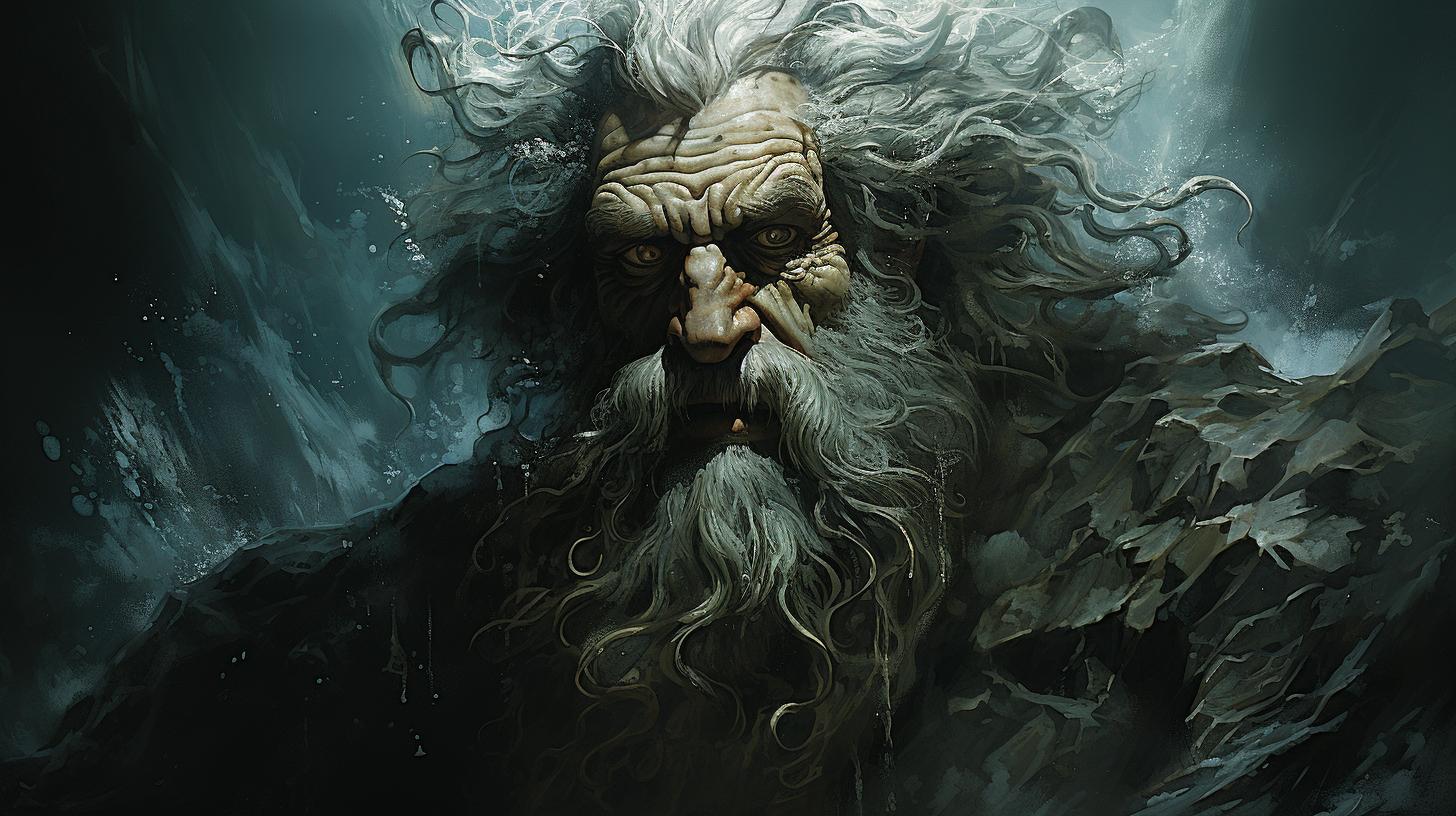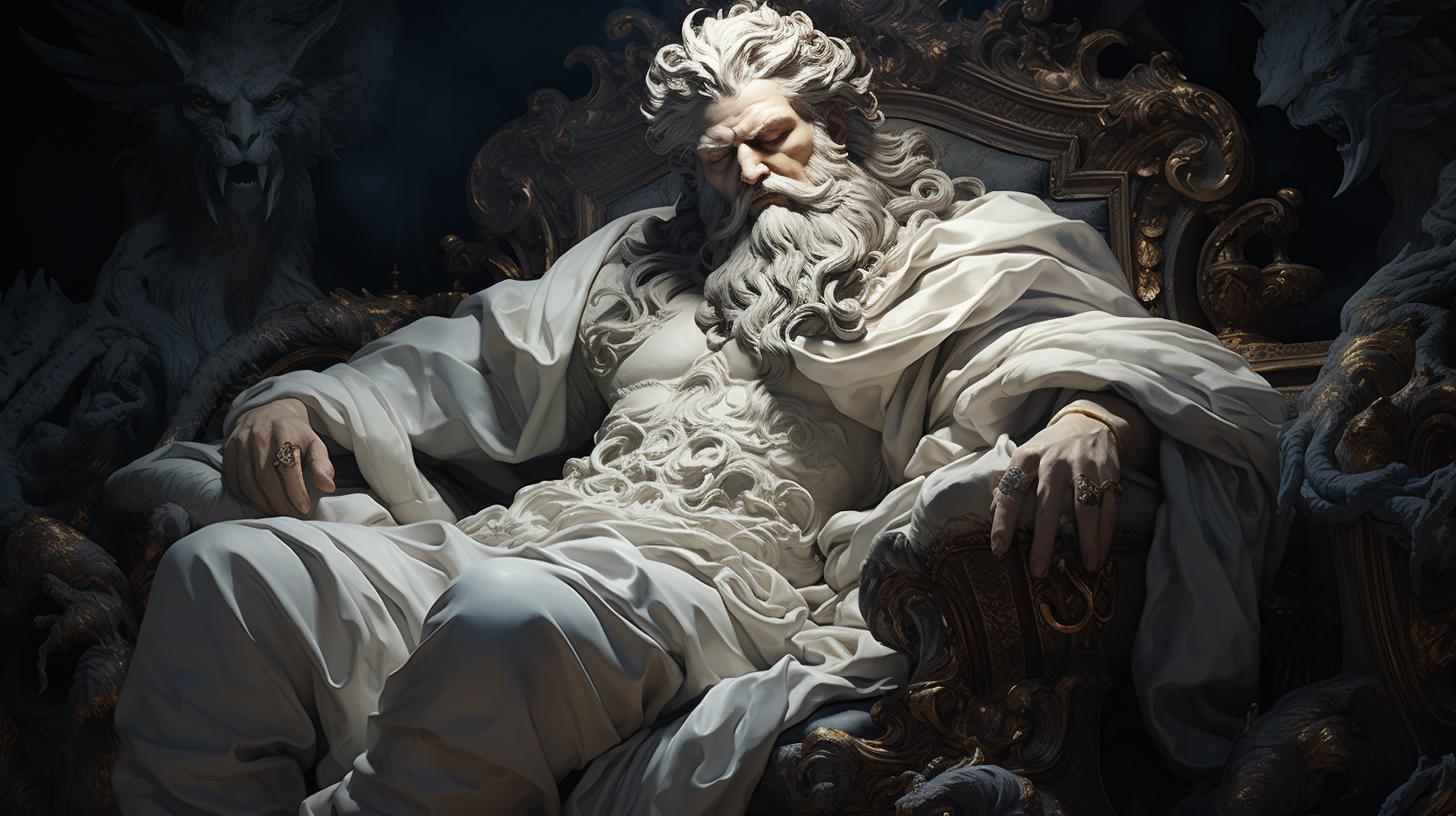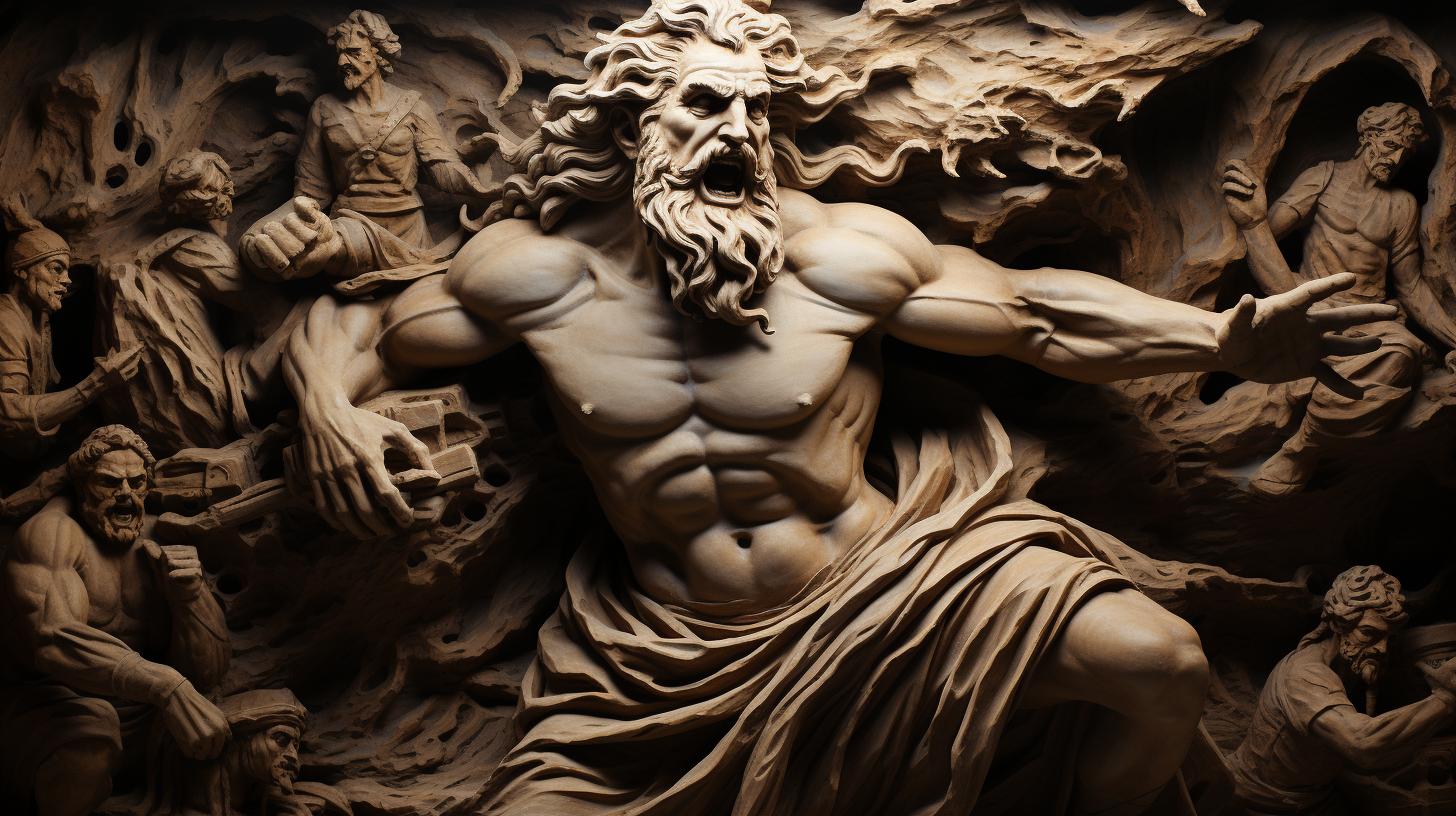Nereus Greek Mythology: The Ancient Sea God and his Enigmatic Powers

Nereus, the ancient sea god of Greek mythology, holds a significant role in the tales of the gods and heroes. Known as the “Ancient of the Sea,” Nereus possesses wisdom, the gift of prophecy, and the ability to change his form.
He guided heroes like Heracles on their quests, offered counsel, and endowed them with direction. Represented as an elderly figure with a wooden staff or a fish-like tail, Nereus is revered as the protector of Greek fishermen, residing in the depths of the Mediterranean and Aegean Seas.
His influence, though lesser known today, continues to intrigue and captivate in the realm of Greek mythology.
The Mythology of Nereus
Nereus, a prominent figure in Greek mythology, holds a fascinating place in the realm of gods and their narratives. Let’s delve into the origins, lineage, and significant roles associated with Nereus.
Origins and Lineage
As the son of Pontus, the god of the sea, and Gaia, the goddess of the Earth, Nereus has deep ties to the elemental forces that shape the world.
His lineage connects him to the vastness of the oceans and the stability of the land.
The Role of Nereus in Greek Mythology
Nereus, often referred to as the ‘Ancient of the Sea,’ plays a multifaceted role in Greek mythology. His wisdom, prophetic powers, and ability to shape-shift make him a compelling and enigmatic deity.
His counsel proves invaluable to heroes and deities alike.
Nereus and the Hesperides: The Quest for the Golden Apples
One of Nereus’ notable connections lies in the quest for the Golden Apples of the Hesperides. He guides heroes, such as Heracles, by providing crucial directions, albeit through formidable encounters in various forms.
Nereus as a Mentor: His Relationship with Aphrodite and Heracles
Nereus assumes the role of a mentor, imparting knowledge and guidance to divine individuals. His tutelage of Aphrodite, the goddess of love, hints at his understanding of the complexities of love and desire.
Additionally, Nereus bestows wisdom upon Heracles, aiding the hero in monumental tasks.
Throughout Greek mythology, Nereus’ influence as a sage advisor and enigmatic deity remains ever-present. Exploring his powers, representation in art and literature, as well as his connections in the Greek pantheon, sheds light on the enduring legacy of Nereus in the ancient world.
The Powers and Characteristics of Nereus
Wisdom and Prophecy: Nereus as the ‘Ancient of the Sea’
Nereus, the sea god of Greek mythology, is renowned for his profound wisdom and gift of prophecy. As the “Ancient of the Sea,” he possesses unparalleled knowledge and insight into the depths of the future.
Nereus’ ability to foresee events and offer guidance made him highly esteemed in the pantheon. His association with divination and foresight highlights his significance in the realm of Greek mythology.
Shapeshifting Abilities: Nereus’ Fluid Nature
One of the remarkable aspects of Nereus is his extraordinary shapeshifting abilities. He can effortlessly transform his physical appearance, assuming various forms that suit his desires or circumstances. This fluid nature allows him to adapt to different situations, making him both versatile and unpredictable.
Nereus’ knack for changing shapes further adds to his enigmatic persona within Greek mythology.
Nereus’ Representation: Depictions in Art and Literature
Throughout ancient art and literature, Nereus has been depicted in different forms, reflecting his multifaceted character. Often portrayed as an elderly figure with a wooden staff, symbolizing his wisdom and authority, Nereus commands respect and admiration.
Occasionally, he is portrayed with a fish-like tail in place of legs, emphasizing his deep connection to the sea. These artistic representations serve as visual testaments to Nereus’ prominent role in the world of Greek mythology.
- Nereus as the ‘Ancient of the Sea’: Known for his profound wisdom and gift of prophecy.
- Shapeshifting Abilities: Versatile and unpredictable, Nereus can assume different forms.
- Representations in Art and Literature: Portrayed as an elderly figure with a staff and occasionally possessing a fish-like tail.
Nereus in the Greek Pantheon
Nereus, the sea god of Greek mythology, held intricate connections with other major deities in the Greek pantheon.
His role and relationships demonstrated his importance and influence within the divine hierarchy.
Relationship with Other Gods: Nereus and Zeus, Poseidon, and Other Deities
Within the Greek pantheon, Nereus shared bonds with various gods, most notably Zeus and Poseidon. As the son of Pontus, the sea god, and Gaia, the Earth goddess, Nereus was a sibling to both Zeus and Poseidon.
Nereus’ connection with Zeus, the king of the gods, showcased his involvement in the divine affairs.
Often depicted as a wise and trustworthy advisor, Nereus offered counsel and insight to Zeus in matters concerning the sea and maritime expeditions.
Additionally, Nereus held a close relationship with Poseidon, the god of the seas.
As brothers, they shared a common domain and were known to collaborate on various occasions, ensuring the safety of sailors and the stability of the oceans.
Besides Zeus and Poseidon, Nereus had interactions with other deities as well.
These connections demonstrate his significance and widespread influence within the pantheon.
Nereus and the Nereids: His Daughters and Their Role in Greek Mythology
One of the most remarkable aspects of Nereus’ lineage is his fifty daughters known as the Nereids. These sea nymphs played essential roles in Greek mythology and had close ties with various gods and heroes.
The Nereids were often depicted as attendants to Poseidon, accompanying him during his marine expeditions. They represented the beauty and grace of the sea, enchanting sailors with their mesmerizing presence.
These nymphs featured prominently in maritime legends and were often associated with significant events involving gods and heroes. Their roles included aiding heroes during their quests, assisting in childbirth, and participating in grand sea celebrations and festivals.
Nereus’ Connection to Doris: The Oceanic Nymph and Wife of Nereus
Nereus’ most notable relationship was with his wife, Doris, an oceanic nymph. Doris was the daughter of Oceanus and Tethys, further expanding Nereus’ ties within the divine lineage.
Together, Nereus and Doris parented the fifty Nereids, solidifying their position within the pantheon and emphasizing their importance in the sea domain.
Doris was often portrayed as a nurturing figure, caring for the marine life and contributing to the overall harmony of the oceans.
Her union with Nereus symbolized the balance and interconnectedness of nature.
These connections within the Greek pantheon highlight Nereus’ familial bonds and his integral role in maintaining the divine order of the sea domain.
Nereus’ Domain: The Depths of the Aegean Sea
Nereus, the ancient sea god of Greek mythology, is closely associated with the Mediterranean and Aegean Seas. In this domain, Nereus reigns over the depths, venturing through the underwater landscapes that stretch beneath these vast bodies of water.
Nereus’ Realm: Life in the Mediterranean and Aegean Seas
Within the expansive realms of the Mediterranean and Aegean Seas, Nereus holds sway. These waters are teeming with marine life, creating a vibrant ecosystem that is intricately connected to the mythos of Nereus.
Here, mythical creatures such as the Nereids, Nereus’ fifty daughters, frolic and dance amidst the azure waves.
The Mediterranean and Aegean Seas serve as the backdrop for countless tales and legends, with Nereus often playing a crucial role.
This domain is characterized by its vastness and mystery, with hidden caves, underwater valleys, and sprawling coral reefs that provide shelter and sustenance for the creatures under the sea.
Mythical Creatures and Enchanting Landscapes
- Enigmatic caverns hiding ancient treasures
- Spectacular coral reefs teeming with vibrant marine life
- Whimsical underwater valleys and breathtaking sea cliffs
- Mysterious shipwrecks that hold stories of the past
- Enchanting seagrass meadows swaying with the rhythm of the tides
The Nereids: Daughters of Nereus
- The Nereids, fifty sea nymphs born from Nereus and Doris
- Each Nereid possessing unique traits and enchanting beauty
- Guardians of the sea, accompanying sailors on their voyages
- Celestial harmonies resonating through their melodious voices
- Often depicted frolicking among the waves with playful abandon
Worship and Devotion to Nereus: The Importance of Nereus to Greek Fishermen
For generations, Greek fishermen have revered Nereus as their patron god and protector.
They turn to Nereus for guidance and blessings, seeking his favor in the treacherous waters of the Mediterranean and Aegean Seas. His benevolence is believed to ensure bountiful catches, safe voyages, and protection from the perils of the deep.
In humble seaside villages, shrines dedicated to Nereus stand as testaments to the unwavering faith of these fishermen. Offerings of gratitude, such as meticulously crafted wooden ships and delicate seashell mosaics, adorn these sacred spaces.
Nereus’ influence extends beyond the seas, permeating the lives of these fishermen. He is regarded not only as their divine guardian but also as a source of inspiration and wisdom, guiding them through the ever-changing tides of life.
Rituals and Offerings
- Prayers of gratitude and supplication at seaside shrines
- Offerings of carefully carved wooden ships, symbolizing safe journeys
- Elegantly crafted seashell mosaics, adorning sacred spaces
- Festivals honoring Nereus, filled with joyful celebrations and rituals
- Traditional dances paying homage to the grace and power of the sea
Nereus’ Guidance and Protection
- Seafaring wisdom imparted to fishermen, aiding them in their craft
- Protection from storms and turbulent waters, ensuring safe returns
- Inspiration to face challenges with resilience, mirroring Nereus’ fortitude
- A deep sense of connection to the vastness of the seas and its divine guardians
- A shared belief in the interplay between the physical and mythical realms
In the depths of the Aegean Sea, Nereus’ domain remains a captivating world filled with mystery and wonder.
The worship and devotion of Greek fishermen to this ancient sea god bear testament to the enduring allure of Nereus and his significance in their lives.
Nereus and His Legacy
Nereus, the enigmatic sea god of Greek mythology, left behind a profound legacy that continues to captivate scholars and enthusiasts alike. His influence can be traced through various aspects of ancient Greek literature and folklore, shedding light on his significance in the pantheon.
In this section, we explore Nereus’ enduring legacy, examining his presence in Homeric works, the shifting perception of Nereus over time, and his lasting impact on Greek mythology.
Nereus in Homeric Works: References and Descriptions by Homer
Homer, the esteemed Greek poet, provides us with valuable insights into Nereus’ character and importance in his epic works.
Though details about Nereus are scarce, Homer’s descriptions portray him as a friendly and sincere elder, possessing extensive knowledge of the future. Nereus’ reticence in divulging intricate details tempts the curiosity of both heroes and readers, adding an air of mystery to his persona.
Triton and the Shifting Perception of Nereus over Time
Over the centuries, Nereus’ prominence gradually diminished, and he was overshadowed by Triton, a god with similar characteristics and attributes. As new narratives emerged, Triton became the favored figure in sea-related mythologies, displacing Nereus from the limelight.
The shift in perception highlights the dynamic nature of Greek mythology, where deities and their roles evolve with time.
The Enduring Influence of Nereus in Greek Mythology
Despite his waning popularity, Nereus’ influence remains ingrained in Greek mythology. His association with Zeus, Poseidon, and other prominent deities showcases his interconnectedness within the divine hierarchy. Moreover, his pivotal role as the father of the Nereids, the fifty daughters who personify various aspects of the sea, further solidifies his lasting presence in ancient Greek lore.
From his elusive wisdom and prophetic abilities to his transformative nature, Nereus captivates the imagination as a figure of wisdom and guidance in the vast depths of the Aegean Sea. Adored by Greek fishermen, his benevolence and protective influence have secured his position as their trusted guardian for generations.
As we delve deeper into Nereus’ legacy, we unearth the intricate tapestry of Greek mythology, interwoven with gods, heroes, and ethereal creatures. Nereus, although often submerged in the shadows of more prominent deities, manages to retain his place as a fascinating and enigmatic figure, forever leaving an indelible mark on the rich tapestry of Greek mythology.
.




















